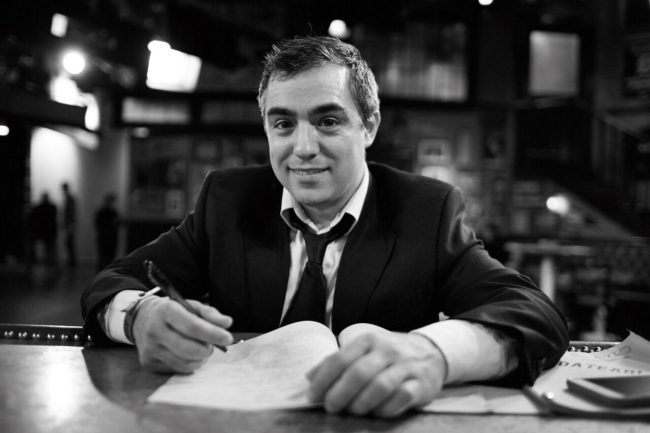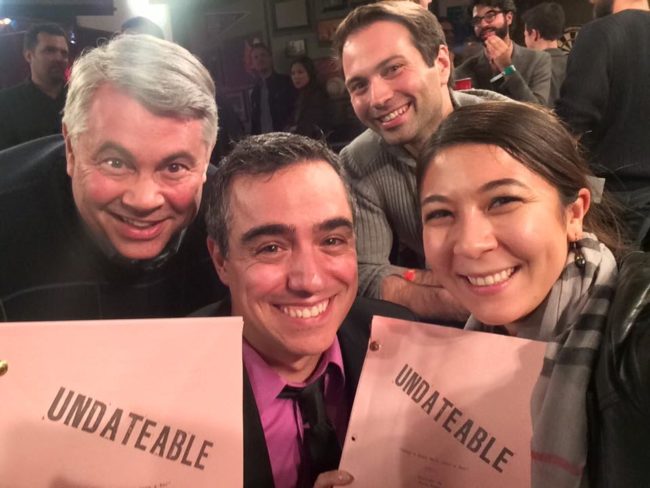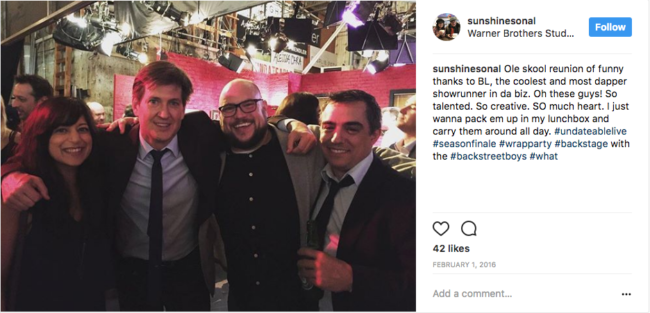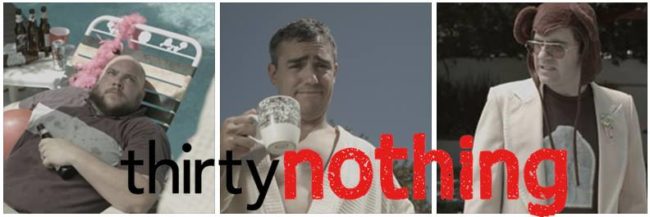Debriefing: Ryan Kemp
As a participant and volunteer in the WGF’s Veterans Writing Project, I discovered that my fellow mentees are a wealth of knowledge. Their experiences and opinions helped (and continue to help) me grow exponentially as a writer. I feel strongly that these vets’ experiences need to be heard and shared with each other at the very least, if not also for posterity. Ideally, I'd like to help found an alumni association to solidify a post-program connection between the vets and the WGF. These interviews, which will be an ongoing blog series called Debriefing, are a good start towards that goal. I first met writer Ryan Kemp a couple of years ago during my yearlong mentorship at the Writers Guild Foundation’s Veterans Writing Project. I was also working as a volunteer for the program, and Ryan was a part of the incoming new track.
I’d like to say I taught him everything he knows, but the truth is, he was miles ahead of me (and most of my fellow mentees) before he even entered the program. Not surprisingly, he’s been up to a lot since then. I interviewed him about being a fellow veteran, writer, and alumnus of the WGF VWP.

Joshua Katz: Let’s start with a little bit about you. Where are you from? And what was your path to becoming a veteran?
Ryan Kemp: It’s a fun story. When I was in high school in Rochester, New York, I wasn’t the best student. My older brother joined the Marines. The recruiter came to pick him up, and as he was leaving, he pointed at me and said, “I’ll be back for him next year.” I [doubted him] because I was the furthest thing from it. Lo and behold, I didn’t really have a lot of ideas [for what to do after graduation]. Financially, college wasn’t an [option]; nobody in my family went to college. I wanted to go, but I also thought I needed structure. I went to the recruiter when I was 17 and my parents had to sign a waiver so I could enlist in 1996. I joined the Reserves, and two weeks after I turned 18, I went to Parris Island. I wish I joined active duty, but I also wouldn’t trade [the experience] I had in college.
J: What was the Reserve experience like?
R: I did about a year of training. It was a lot of fun. I grew up with firearms; my dad had them so [I was around] them at a young age. So, we got to learn how to repair guns.
After finishing Reserve training, I started at Oswego State University, New York. I started my degree in Graphic Design, but I ended up in Communications. Two weeks over the summer I would do combined arms exercises in Fort Knox. We got to work with a lot of different components of the Marine Corps. It was neat to work with so many people from all over the country. It was tough to balance the weekend drills with college; it wasn’t like the commercials. The commercial was like, “This weekend I programmed helicopters, built a bridge, and on Monday, class was a breeze.” That wasn’t my experience.
J: How did being a vet translate into the [path] of becoming a writer?
R: When I came back from Oswego, I started doing stand-up because I just found everything funny—my experiences, boot camp. I was cleaning carpets, waiting tables at Olive Garden, and doing stand-up, so I decided to go for it. I went to grad school at Syracuse, got a masters degree, and moved out to L.A.
I was part of those Marines where if you said, “We have to go dig this ditch,” I would be like, “yeah, let’s go f**king dig this ditch!” A lot of times in L.A. people would say, “okay, we’ve got to build this thing,” and then they would have meetings and talk about it for a while. By the time they were done [talking about it], I’d already be done.
J: That has been my experience [in L.A.] as well. People are amazed that you want to work hard, and when you’re done, you ask, “What’s next?”
R: Yeah, in the Marines, you learn that if someone tells you to do something, you do it. If they have to tell you twice, you f**ked up. Boot camp taught me the mantra I still live by: “It doesn’t matter if you want do it or if you can do it, you just have to do it.” But it wasn’t just that my work ethic was different. I think it takes a certain type of person to join the military. You don’t see a lot of higher-income people in the military.

J: Us being two military gun guys—that’s a special thing. Everybody has their job, and if they do it, the machine works.
R: That’s another thing. We’re all on the same team.
J: How does that translate to the writers’ room?
R: There’s just so much conflict, discussions and meetings on meetings. I’m like, just do it. In the military, if you don’t make the right decision and follow orders, everybody [could] die. It’s great training. I’m working on Rosanne right now, which is great. The writers in this room are great, really smart. They’re down-to-earth and really nice people.
J: Do you agree with the statement: “There’s nothing better than working on a project when you look around the room and you know that everybody in it deserves to be where they are.”
R: Yes, it’s so awesome. I’m grateful [to have] that. The pilot I most recently wrote is the one I started in the WGF program, and it’s about three Marines who split a one-bedroom apartment after they get back from Afghanistan. It’s based on a real situation when I had two of my buddies who were sleeping on my couch for about four months. It was absolutely not sustainable, but it was so much fun. It was therapeutic bonding.
J: I wonder if you can talk a little bit about the WGF Veterans Writing Project. How did you get into it? Had you done any writing stuff before?
R: I came out to L.A., and I did things like The Comedy Store main stage, IO, UCLA extension programs, UCB. I worked on Scrubs for about five years, as a location assistant for about two seasons, a writer’s PA for two seasons, and a writer’s assistant for a season.

J: How did you get into that?
R: Syracuse. I had a buddy who graduated before me working on Scrubs and that’s why I chose the program, because it was good for working out here. I got to work with some really great people. I had the opportunity to shadow [showrunner] Bill Lawrence. He’s a great guy. I ended up on Undateable, which was the same Bill Lawrence camp that I worked with on Scrubs.
As a script coordinator, you get to sit in on director’s notes, executive’s notes, network and studio, casting sessions. You learn so much from the production side, and studio side, and office side. It’s incredible. It’s like a Ph.D. in running a TV show. While I was at Undateable, I found out about the WGF Veterans Writing Project. I asked Bill if he would write a letter of recommendation for me, and he did. The program was so important for the same reasons I said before. It takes a certain type of person to join the military. It’s not about the stuff that happened, it’s about the camaraderie. All these men and women are your family; you rely on everyone. It’s something bigger and better than self-preservation.
J: Yes, [Hollywood] is a very… cynical town.
R: Cynical is a good word for it. I don’t want to offend anyone... but, in the Program, we’re all in this together, and we’re all trying to get into [the industry]. You’re not alone. We’re veterans, and we’re just as capable of doing the job and telling stories as anybody else.
I finished my pilot in the program, and Bill let me write an episode of Undateable. The first thing he said to the writers in the room was: “I’ve known Ryan longer than any of you, and he’s a Marine.” That got me a manager. I sent him the pilot I wrote in the WGF Program, and I got a lot of great reviews. I’m still rewriting it. I couldn’t have gotten where I am now with [the story] without [the WGF Program].

J: What’s next for Ryan Kemp?
R: My web series: Thirtynothing. It’s about regular people trying to be adults. We have six episodes up. It’s [being done by] a bunch of people who have all been working in the industry for the last 10-12 years. We all just want to make our own content. These are people who have edited and produced hundreds of television episodes. I’ve written one, but I’ve script coordinated, like, 200 episodes of TV at this point.
J: What advice would you give to veterans who are trying to get into writing or entertainment?
R: Do your best every day. If anything gets in your way, turn your experiences, good or bad, and make them great and unique.
Joshua Keller Katz is a writer, Navy veteran and actor. He is also an alumnus of the WGF Veterans Writing Project and volunteer for the program. You can follow him on Facebook, Twitter, and IMDb.
